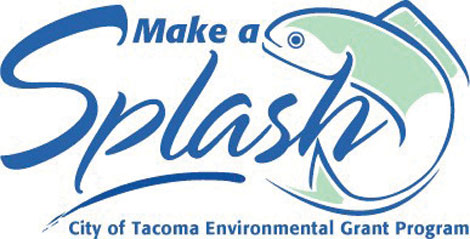Stepping in dog poo or (preferably) watching for and avoiding it when out for a walk or enjoying a park or playfield ranks near the top of anyone’s list of least favorite things. As bad as it is for your enjoyment of being outside, not to mention for your shoes, the unpleasantness is even worse for the health of people, pets and the environment.
The detrimental impact of Fido’s feces on streams, lakes and Puget Sound is a particular concern for the City of Tacoma’s Environmental Services and its surface-water management program, whose job it is to protect water quality. Officials note that water draining from streets and sidewalks, yards and other areas carries pollutants into streams, lakes and Puget Sound. Responsible dog owners can nip at least one source of pollution—their pets’ waste–in the bud by picking up after their pooches.
If they don’t, the poo becomes a ticking health risk. The stuff is raw sewage, filled with harmful, disease-carrying bacteria and parasites ranging from E coli to roundworms. If not cleaned up, dog poop can unleash roundworm eggs and other parasites into the surrounding soil and get into surface water. In rainy weather, stormwater carries the unmentionables directly into streams and eventually into Puget Sound, creating health hazards for fishing and other forms of recreation. According to the federal Environmental Protection Agency (EPA), a single gram of dog waste can contain an estimated 23 million fecal coliform bacteria that, if accidentally ingested by humans who unwittingly come into contact with it, can cause cramps, diarrhea, intestinal illness, and serious kidney disorders. Pets can be infected, too.
The EPA ranks pet waste as a major cause of water pollution. One dog’s contributions to the problem may seem small, but when combined with dog populations as a whole, the pooh factor adds up to big trouble for water quality. The EPA estimates that two or three days’ worth of droppings from 100 dogs in a 20-square-mile watershed area can generate enough bacteria to temporarily close a bay to swimming and harvesting of shellfish.
Dogs can’t pick up after themselves, so it’s up to their owners to put the poop in its proper place. When walking their dogs, they can carry a plastic bag from home or take one from pet waste stations. If their canine makes a deposit, they can bag the waste and drop it in a trash can. Done.
Besides being a responsible thing to do, poop scooping is a legally required civic duty. In Tacoma, owners who leave their dogs’ doo-doo on public or private property can be fined as much as $250.
Want a pet waste station in your neighborhood?
To apply to sponsor a dog waste station in the City of Tacoma, you should live inside the city, pick a location in a neighborhood where dog poo is a problem (such as a park, open space, greenbelt, etc.), and provide a neighborhood “sponsor.” The sponsor will help monitor the station’s use, condition and supply of bags, and report the number of bags used at the end of each year. For more information or to apply, call 253-502-2220 or go online at https://www.cityoftacoma.org/cms/One.aspx?portalId=169&pageId=3084
Poop scoop: It’s the law
Under The City of Tacoma municipal code, it is illegal for a dog owner to not “immediately†remove fecal matter left by the dog on someone else’s private property. The same goes for public property. Also, any animal that trespasses on private property without the permission of the owner or caretaker of the property can be seized and impounded by animal-control authorities. Violations of these and other animal-control regulations in Tacoma are misdemeanors and can bring a fine of up to $250.
This is the second in a series of articles sponsored by the City of Tacoma, its Environmental Services Department, and the Make a Splash grant program.
